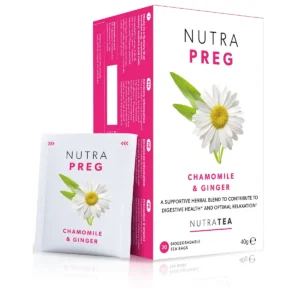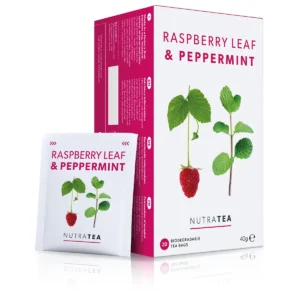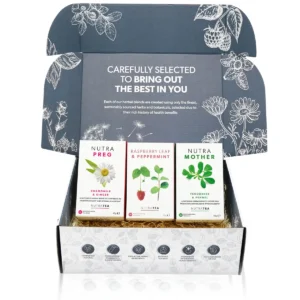NutraBlog
Our guide to herbal tea for pregnancy

Pregnancy is a time of transformation and care. From managing morning sickness to encouraging rest and digestion, herbal tea for pregnancy can be a comforting and natural companion through this special journey. In this guide, we explore the most commonly recommended pregnancy-safe herbal teas, including chamomile, ginger, peppermint, and raspberry leaf, highlighting their benefits in each stage. You’ll also learn which safe teas during pregnancy are best enjoyed in moderation, which should be avoided, and how the simple ritual of sipping tea can become a soothing moment of self-care as your body changes. Always consult your healthcare provider when introducing any new herbal teas during pregnancy.
Pregnancy is a beautiful journey, but it also brings a wave of new physical and emotional experiences to navigate along the way.
As your body works overtime to support your growing little one, taking care of yourself becomes paramount. And, while dietary changes and gentle exercise often take centre stage, the simple ritual of enjoying a warm cup of tea can offer moments of comfort and targeted support throughout your pregnancy journey.
This blog explores gentle and beneficial herbal blends that will help look after you in pregnancy, from easing morning sickness with zesty ginger to promoting relaxation with calming chamomile, discover how these natural brews can support you through this unique journey.
Keep in mind that it’s all about moderation – the NHS advises to drink no more than 1-2 cups of any herbal tea a day during your pregnancy.
Is chamomile tea safe during pregnancy?
Chamomile is a delicate, daisy-like flower that has long been celebrated for its calming and soothing properties, making it a great support during pregnancy. Its mild sedative effects can help ease tension, promote relaxation, and encourage a restful night’s sleep.
Chamomile’s gentle anti-inflammatory properties can also offer relief from mild digestive discomfort.
Could ginger tea help with morning sickness?
Nausea and morning sickness are incredibly common in early pregnancy. Ginger, with its warm and spicy aroma, has been traditionally used to soothe queasy tummies. Try a cup of ginger tea, made with fresh ginger slices or a high-quality ginger tea bag to help settle your digestive system and alleviate those debilitating feelings of nausea. Its natural anti-inflammatory properties can also offer gentle relief from other minor aches and pains.
Is peppermint tea good for bloating and digestion during pregnancy?
As your pregnancy progresses, it’s not uncommon for digestive changes to cause feelings of bloating and indigestion. Peppermint tea, with its invigorating aroma and cooling sensation, can be a refreshing and helpful remedy. Its antispasmodic properties can help relax the muscles in your digestive tract, easing discomfort and promoting smoother digestion, especially after a meal.
When should you drink raspberry leaf tea during pregnancy?
Raspberry leaf tea has garnered much attention for its potential benefits in the later stages of pregnancy. Traditionally used to tone the uterus, it’s believed that raspberry leaf tea can help prepare the body for labour. However, it’s crucial to note that raspberry leaf tea is generally only recommended for consumption after 32 weeks, and you should always discuss with your healthcare provider before drinking it.
What teas should be avoided during pregnancy?
While many herbal teas offer gentle support, some should be approached with caution or avoided entirely. These include teas containing high levels of caffeine, as well as certain herbs that may cause stimulating or other effects not recommended during pregnancy. Speak to your doctor or midwife before drinking any herbal teas.
The ritual of self-care
Beyond the potential health benefits, the simple act of preparing and savouring a warm cup of tea can be an invaluable moment of self-care during pregnancy. It’s a chance to pause, breathe, and connect with the incredible journey your body is undertaking. So choose a comfortable spot, pour yourself a cup of herbal tea, and embrace a moment of calm.
Pregnancy is a unique and transformative experience and, by choosing gentle and supportive herbal teas, such as chamomile, ginger, peppermint, and raspberry leaf, you can find comfort and well-being amidst the changes.
Here’s to a healthy and happy pregnancy, one soothing cup at a time.
Your Questions Answered
Are all herbal teas safe during pregnancy?
No. While some are supportive, others can be harmful. Always check with your doctor or midwife before drinking any herbal teas when pregnant.
Which teas are usually considered safe during pregnancy?
Chamomile (for calm), ginger (for nausea), peppermint (for digestion), and rooibos (for caffeine-free hydration) are commonly recommended.
Can I still drink black or green tea while pregnant?
Yes, in moderation. Keep your total daily caffeine intake under 200mg per day. Always check individual caffeine levels and speak with your healthcare provider for guidance.
Which herbal teas should be avoided during pregnancy?
Avoid herbs known to stimulate the uterus or act as strong laxatives, such as pennyroyal and senna. When in doubt, consult a qualified healthcare professional.



